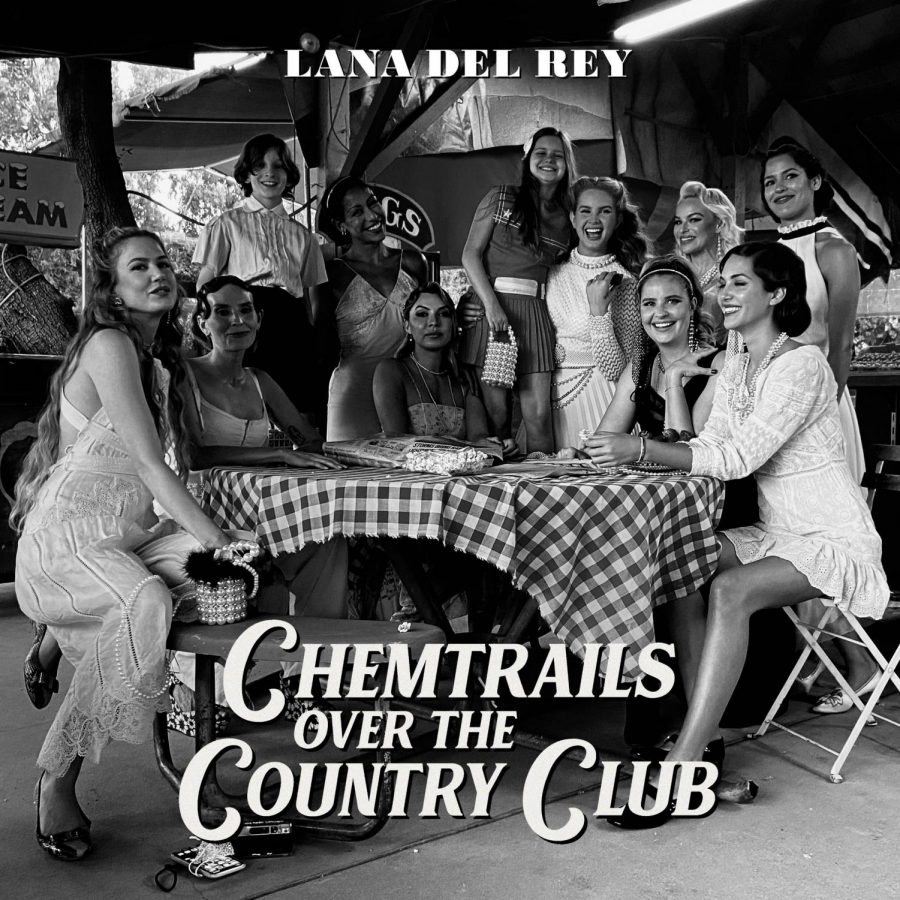Lana Del Rey’s “COCC” is familiar, yet adventurous
April 16, 2021
Elizabeth Grant, known professionally as Lana Del Rey, released her seventh studio album, “Chemtrails Over the Country Club,” on March 19. Grant has been a contributor to popular music for the last decade, as she was the third woman in history to have an album on the Billboard 200 chart for at least 300 weeks. In her early career, fans were drawn to her unique visuals and sultry vocals. Grant contributed to Internet Culture through her first studio albums “Born to Die” and “Paradise,” through her grainy vintage music videos and romantically tragic musical storylines.
Grant worked on “COCC” alongside acclaimed producer and songwriter, Jack Antonoff. Antonoff is notable for working on albums with other artists such as Lorde and Taylor Swift. Antonoff also served as a producer and songwriter for Grant’s 2019 album, “Norman F—ing Rockwell.”
“COCC” feels familiar to “NFR” as she continues to express vulnerability. Tracks in the album often sound like continuations of tracks from NFR. Grant sings about freedom in relation to both herself and a romantic relationship in “Wild at Heart,” which features vocal parallels from “NFR.”
In the first track, “White Dress,” Grant reminisces about her past before fame and wonders if a happier life for herself would be a reality without her disillusionment with the music industry and the public eye. Grant’s raspy vocals resemble a strained whisper. “When I was a waitress wearing a white dress/ Look how I do this, look how I got this.”
Grant continues to indulge in nostalgia in “Let me love you like a woman.” Grant sings about the mundanity of life, accompanied by piano. “We could get lost in the purple rain/ Talk about the good old days.”
In “Tulsa Jesus Freak,” Grant references a common theme in her discography, which is her Catholic upbringing. The instrumentals are repetitive and chilling and are followed by bright vocal layers.
Towards the end of the album in “Dance Till We Die,” 70s style Folk Rock is present. Grant transitions from her conventional low and soft voice and instrumentals to groovy and upbeat rhythmic rock, that includes saxophone and powerful vocals. This track includes a new distinct sound, that cannot previously be heard from Grant.
The final track, “For Free,” is a cover of Canadian folk musician Joni Mitchell’s song by the same name. The track features Weyes Blood and Zella Day. Blood’s rich and strong alto strongly resembles Mitchell’s vocal style. Day’s voice complements the light piano notes that harmonize alongside Grant. Day and Blood are a notable highlight in this track.
Grant has consistently mentioned American themes throughout her discography. References include famous cities, Marilyn Monroe, James Dean, Walt Whitman, Jim Morrison and the Kennedys in the 2012 music video for “National Anthem”.
Listeners being aware of the political climate, and knowing where Grant stands within that, has led fans to be critical of Grant’s choices inside and outside of her career. In 2019, music critic Ann Powers wrote for NPR stating that, “Lana Del Rey Lives in America’s Messy Subconscious.” Adding to the criticism that Grant faces, is her references of themes found in unhealthy romantic relationships. This year, Mina Tavakoli, wrote for Pitchfork stating that Grant’s music references “violence-as-romance and romance-as-violence.”
Fans are supportive of their favorite musicians’ music, and with this comes criticism and sparking dialogue regarding the artist as a whole, Grant’s fanbase is no different. The social issues that Grant has advocated for, contradict many of her questionable statements she has notoriously made on feminism and female artists, and these statements are worth decoding. Grant issued a Twitter statement in response to Powers’ article stating that she “never had a persona.” Grant has undeniably created a persona of a troubled young woman that indulges in illicit substances and inattentively skips through the “freedom land of the 70s.” Powers’ statements on Grant’s references carry truth and relevance.
“COCC” proves that less is more, throughout the album, there is a seamless transition from a piano ballad to Americana genre styles of folk and country. Instrumentals compliment the hopeful, airy feel of Grant’s previous album, “NFR”. With “COCC” listeners can expect solid songwriting, dreamy imagery, and a new creative direction taken by Grant.


